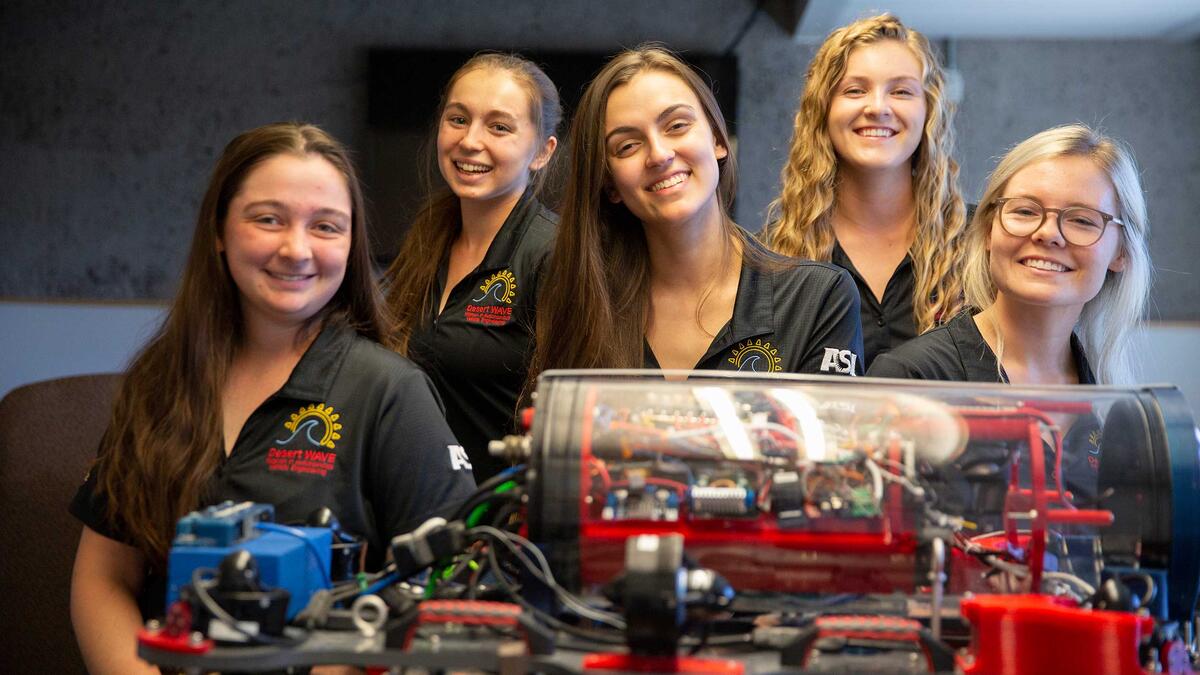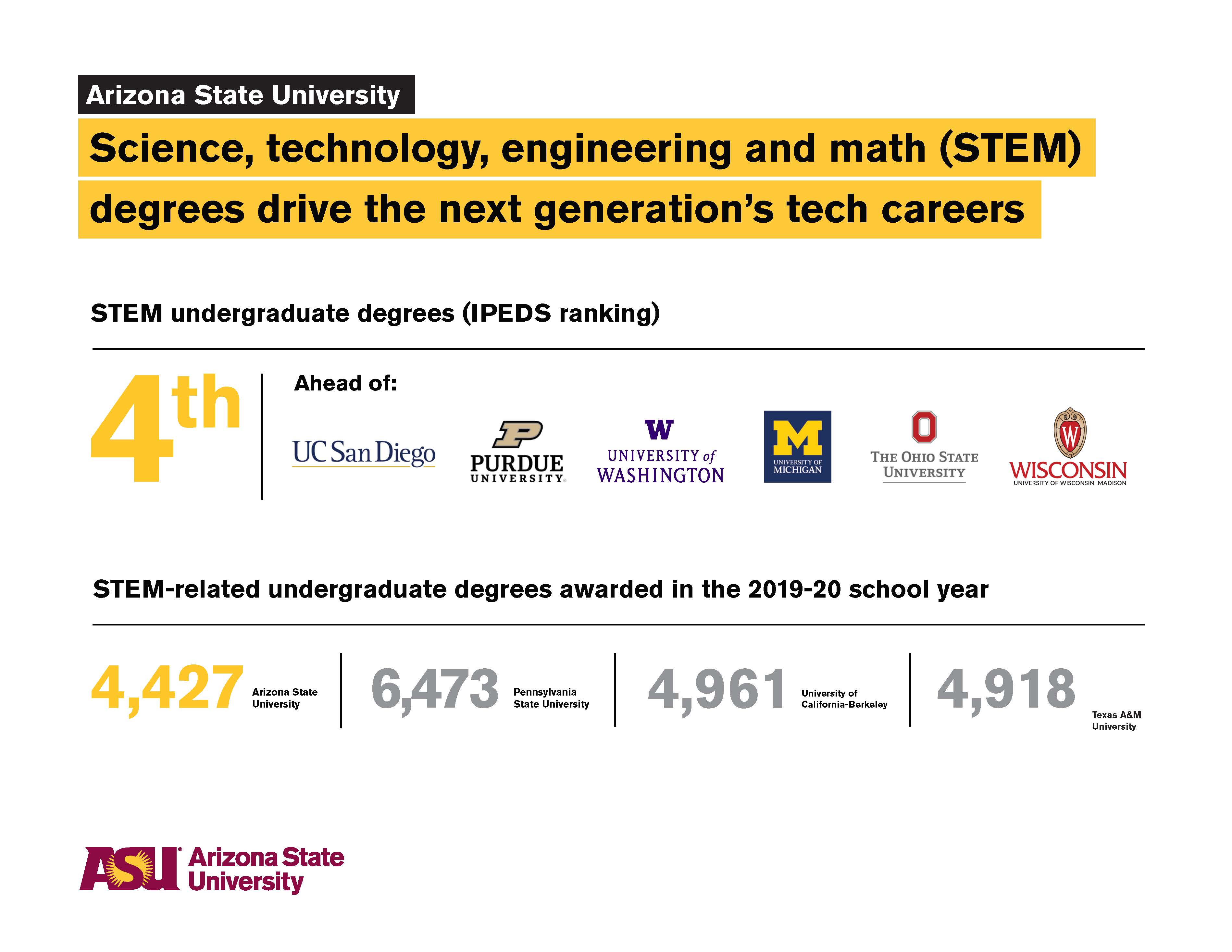Arizona State University, an emerging national leader in educating the next generation in engineering and science, ranks fourth in the United States for undergraduate degrees in STEM-related fields.
With 4,427 STEM-related undergraduate degrees awarded in the 2019–20 school year, ASU is among the national leaders along with Pennsylvania State University (6,473), the University of California-Berkeley (4,961) and Texas A&M University (4,918).
ASU ranks ahead of Purdue University, University of California-San Diego, University of Washington, University of Michigan, Ohio State University and the University of Wisconsin, among others based on recent Integrated Post-Secondary Education Data System (IPEDS) figures.
“Arizona State University’s focus on graduating students with STEM degrees is a response to shifting dynamics in the marketplace and competitive forces across the globe,” ASU President Michael Crow said. “Students who graduate with degrees focused on STEM-related fields enjoy dynamic career opportunities and earn high wages, but that’s only part of the equation. It also serves an industry that is growing rapidly as America refocuses on its international competitiveness in manufacturing, research and development industries that rely on skilled STEM professionals. Our job is to help fill that pipeline.”
The STEM degree numbers are summarized in a recent Higher Ed Data Stories blog written by Jon Boeckenstedt, vice provost for enrollment at Oregon State University. Writing about Boeckenstedt’s blog, senior contributor to Forbes Michael Nietzel said: “It’s encouraging to see that STEM degree productivity is greatest at exactly those universities that by virtue of their faculty, facilities and funding have well-established capacity and reputations for excellence in engineering and science. It’s a clear case of institutional mission and educational outcome coming together in the way they should.”
STEM-related fields are a cornerstone of ASU's New Economy Initiative, a bold new effort to ensure Arizona is prepared for a future economy dependent on strong engineering, high employment, strong economic growth and economic resilience.
The initiative will invest $10 million to:
- Grow the faculty in ASU’s Ira A. Fulton Schools of Engineering to accelerate research intensity to the levels of Stanford, MIT and Georgia Tech.
- Broaden student access and graduate more than 5,000 engineers annually by 2025.
- Complete the launch of a global school alliance for engineering design.
- Emerge as a top 15 U.S. engineering college.
- Make metro Phoenix one of the largest producers of technology and engineering talent in the country and a first-tier center for knowledge-driven economic change.
The initiative will invest another $10 million to establish five Science and Technology Centers that will drive job creation, create hundreds of new industrial partnerships and startups, and advance STEM education and workforce training. The goal is to be a top five university patent provider and a top 10 university tech transfer center.
The initiative also will invest $26 million in faculty, classroom space, experiential learning programs and student support services. This investment will help shorten the time to earn a degree and increase options for current students, and accelerate the development and deployment of new ways of learning — such as Dreamscape Learn, ASU’s new virtual reality immersive biology curriculum through a partnership with Hollywood’s Dreamscape Immersive.
STEM-related programs already are thriving at ASU, including:
- L’Space program, designed to attract space-exploration-minded science and engineering students and encourage them onto a career path that could lead to their participation in NASA spaceflight mission teams.
- The Desert WAVE team, which helps spark more women’s interest in the field of autonomous underwater vehicles. The team also engages in hands-on community outreach to encourage K–12 girls to explore STEM fields.
- The Science Foundation of Arizona has a Center for STEM at ASU that fosters inclusive environments for STEM students who use the community college system, providing them access along their pathway to various degree levels.
Top photo: ASU’s DesertWAVE team members with their first autonomous underwater vehicle. In 2020, the team won second place overall in the 23rd International RoboSub Competition. Photo by Connor McKee/ASU
More Science and technology

Diagnosing data corruption
You are in your doctor’s office for your annual physical and you notice the change. This year, your doctor no longer has your health history in five-inch stack of paperwork fastened together with…
Large-scale study reveals true impact of ASU VR lab on science education
Students at Arizona State University love the Dreamscape Learn virtual reality biology experiences, and the intense engagement it creates is leading to higher grades and more persistence for biology…

ASU-led space telescope is ready to fly
The Star Planet Activity Research CubeSat, or SPARCS, a small space telescope that will monitor the flares and sunspot activity of low-mass stars, has now passed its pre-shipment review by NASA.…



